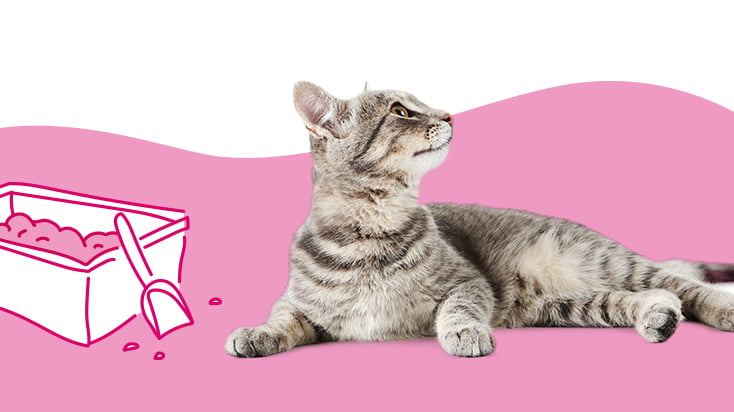Why Is My Cat Pooping Blood? 9 Possible Causes

Table of Contents
Monitoring your cat's litter tray is more than just a routine chore for pet parents; it's a glimpse into their feline's digestive health. Ideally, cat stool should be brown to dark brown. However, if you observe blood, it's natural to feel concerned about its cause and implications.
While it could be due to simple factors like a change in diet, it's a symptom that warrants attention. Even with a minimal amount of blood, considering a home vet visit can be a smart step to ensure your cat's well-being.
Below are nine potential reasons for blood in your cat's stool.
1. Viral, Bacterial, and Fungal Infections
Gastrointestinal (GI) tract infections can lead to irritation and bleeding in the digestive tract. These can be bacterial, like Salmonella; viral, like feline panleukopenia virus; or rare fungal infections, like histoplasmosis.
GI tract infections typically involve symptoms of diarrhea, vomiting, and loss of appetite, as well as blood in the stool from gastrointestinal bleeding.
2. Intestinal Parasites
The presence of blood in cat stools could be due to intestinal parasites like coccidia, giardia, and hookworms. These parasites attach themselves to the lining of the intestines to feed, damaging them and sometimes leading to bloody stools. The parasites not only steal nutrients from the pet, they cause symptoms that lead to malnutrition and weight loss.
3. Food Intolerance
Food allergies or intolerance due to dietary changes can lead to diarrhea and bloody stools. For example, blood in a kitten's stool can be a reaction to a new diet after weaning.
4. Foreign Bodies
Your cat might swallow or ingest foreign objects, such as bones, that can cause damage to the digestive tract of your cat. Rectal bleeding can also occur as they try to pass the object.
5. Toxins
There are a number of toxins that can cause blood in cat stools. The consumption of corrosive materials can erode the lining of the small intestine causing ulcers in the digestive tract.
Rodenticides (rat poisons) work by preventing normal blood clotting, and so can lead to bloody diarrhea in cats who ingest the poison.
6. Diarrhea and IBD
IBD can cause severe inflammation that leads to bleeding of the digestive tract. You may notice your cat pooping a jelly-like substance with blood streaks in it, as the stool passes through the irritated colon.
Severe diarrhea can also be accompanied by bleeding, as the gut wall is so irritated. Prolonged bouts of diarrhea can cause intense dehydration, and so should be treated quickly.
7. Constipation
Constipation in cats makes the defecation process difficult, since the poop is dry and hard in the colon. The straining often leads to blood in your cat's stool. Constipation may be caused by an incorrect diet or dehydration.
8. Organ Dysfunction
A bloody cat stool can be a symptom of organ failure. For instance, kidney disease can cause ulcers in the stomach and intestines. If this is the case, the bloody stool will not necessarily look red, as it will be partially digested in the intestines. The cat's poop may look black and sticky like tar.
9. Cancer and Other Growths
If you have a senior cat with blood in its stool, it is important to bear in mind that malignant cancers and benign growths of the intestinal tract may bleed. The bleeding may not be consistent, so you may notice blood in the cat's stool one day but the next day it appears normal.
What Should I Do If My Cat Has Bloody Stool?
If your cat has bloody stools, it's essential to visit your veterinarian promptly. Most situations should be addressed within 24 hours. However, it becomes an immediate emergency if your cat shows any of the following symptoms:
- Lethargy
- Pain
- Weakness
- Vomiting
- Pale or deep red gums
Same-Day In-Home Sick Pet Visits
Don't wait for your pet's condition to worsen. Our mobile veterinarians provide same-day and next-day in-home sick pet visits. Schedule now for peace of mind.
To diagnose the cause of the bloody stool, the vet will first ask about your cat's health history and lifestyle. A physical examination and a stool check for bacteria or parasites follow. If the cause remains unclear, further tests like blood cell count, ultrasound, X-ray, and others might be necessary.
Treatment for blood in the stool varies based on the diagnosis. For bacterial infections, antibiotics are typically prescribed. If constipation is the issue, stool softeners can offer relief. Additionally, a change in diet might be suggested by your veterinarian depending on the specific diagnosis.
Conclusion
The presence of blood in your cat's stool is a clear signal that professional intervention is needed. While the reasons can vary from mild to severe, it's crucial to remember that blood in the stool is not a typical occurrence.
To ensure your cat's well-being and get a precise diagnosis, consider scheduling a home vet visit. This convenient option allows for a thorough examination in a familiar environment, reducing stress for your pet.
Frequently Asked Questions
Is blood in a cat's stool an emergency?
Yes. Treat your cat's bloody stool or diarrhea as an emergency unless you know the cause of the blood in the stool. Promptly consult a veterinarian for diagnosis and treatment.
Can a cat seem normal despite blood in their stool?
Yes. Your furry pet can act normal despite having blood in its poop. If this happens, keep calm. Blood in the stool is a hint about the health of your cat, and you will need veterinary assistance to rule out the possibility of serious conditions.
How can I prevent bloody stools in cats?
Follow your veterinarian's advice on your pet's diet and deworming schedule. Ensure they are up-to-date with their routine vet checkups and vaccinations, which can help prevent viral causes of bloody stools. Monitor your cat's litter tray and consult your veterinarian if you notice anything unusual.
How often should I check my cat's stool for issues?
You should observe your cat's stools every day to check for abnormalities. Your veterinarian can advise you whether routine stool examinations are recommended based on the prevalence of parasites in your local area.






